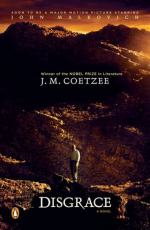|
This section contains 2,763 words (approx. 10 pages at 300 words per page) |

|
Does Petrus Embody the Transition South Africa Is Making between Apartheid and Democracy?
Summary: In "Disgrace" by J.M. Coetzee, Petrus can be seen as an apparently peripheral figure in the novel because of his position society and because he only has tenuous links with the protagonist, David Lurie. Nevertheless he is without doubt the character most central to our understanding of post-apartheid South Africa, as he is the character who clashes the European idealised David Lurie.
Disgrace has been called "a subtle, multi-layered story, as much concerned with politics as it is with the itch of male flesh,"1 not only suggesting that Coetzee's novel shows the vivid consequences of post-apartheid South Africa but also that the characters themselves are very lifelike. The whole novel comes from the viewpoint of its protagonist David Lurie, allowing the readers to gain a fuller understanding of his western European culture in this African context. The title "Disgrace" obviously refers to Lurie's disgrace at the beginning of the book. However there are more profound disgraces later on in the novel, like when he fails to protect his daughter, and finally his defeat by Petrus which represents the defeat of western society.
As well as this complicated protagonist, Coetzee's novel includes a series of minor characters that arguably have more to tell us about South African society than Lurie does...
|
This section contains 2,763 words (approx. 10 pages at 300 words per page) |

|


